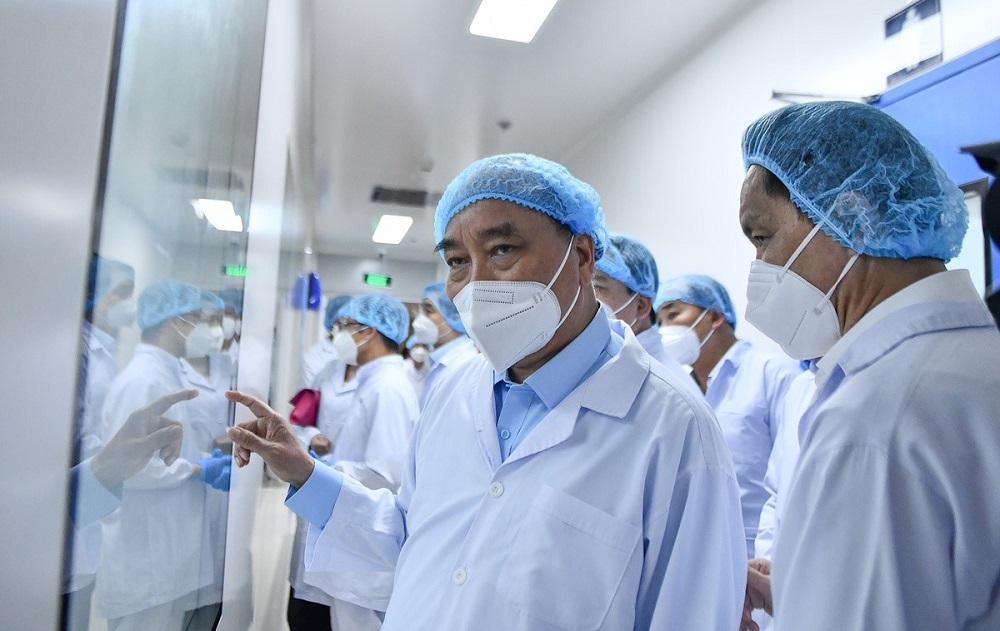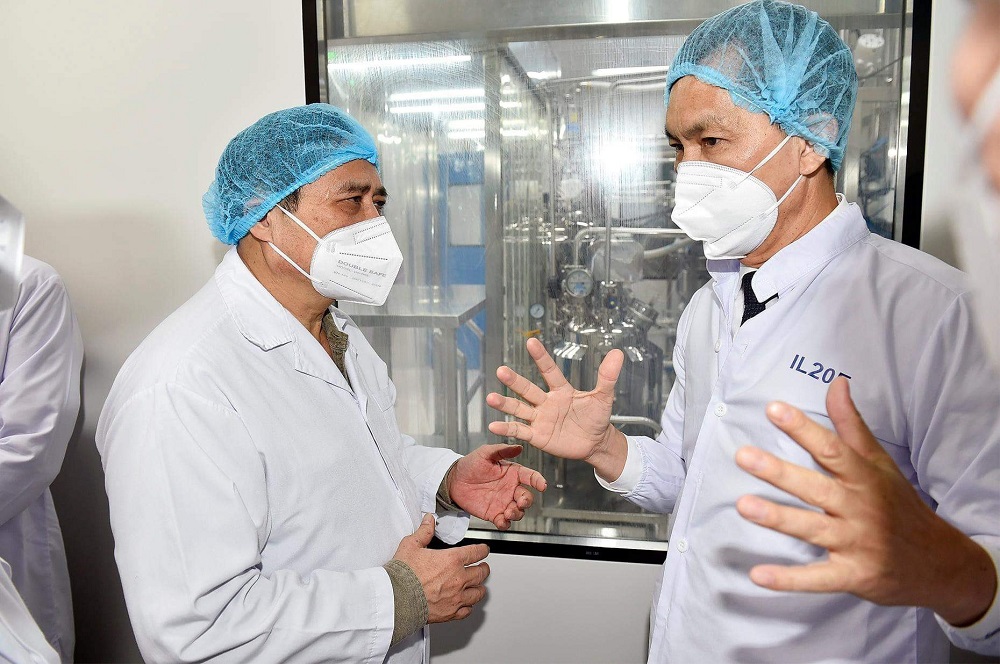Vietnam homegrown Covid-19 vaccine Nanacovax soon approved
The Ministry of Health is asked to minimize administrative procedures that hinder vaccine production and to support businesses as much as possible to solve the most concerning issue.
Made-in-Vietnam Nanocovax Covid-19 vaccine will likely get approval for emergency use at home soon after its three-main phases of clinical trials ensuring the safety and efficacy for about 14,000 adult volunteers.
| Vietnam's President Nguyen Xuan Phuc visits the Nanogen plant on July 20. Photo: Zing |
The move was agreed upon by Vietnamese President Nguyen Xuan Phuc on his working visit to the Nanogen plant in Ho Chi Minh City (HCMC) on July 29.
Phuc asked the Ministry of Health to facilitate the licensing of Nanocovax, a Covid-19 vaccine candidate developed by Nanogen Pharmaceutical Biotechnology JSC (Nanogen).
“Vietnam needs to produce vaccines in the context of a national emergency when the pandemic threatens people’s lives,” he said in his work trip to HCMC, the epicenter of Vietnam.
The development of homegrown Covid-19 vaccines was launched in March 2020 with financial support by the Government, which was then led by Prime Minister Nguyen Xuan Phuc.
Phuc said the production of homegrown vaccines reflects the national self-reliance in health security and ensuring healthcare for the people. It will not only be for domestic consumption but also for export, he emphasized.
The President said he agreed with Prime Minister Pham Minh Chinh to invite the World Health Organization (WHO) representatives to make an appraisal of the vaccine candidate.
Nanocovax vaccine, developed on the protein-based recombinant DNA technology, began phase 1 clinical trials in December 2020 and almost finishes phase 3 clinical trials. In all clinical trials phases, a few of more than 14,000 volunteers had a strong reaction to the vaccine and none died of it.
| Dr. Ho Nhan, CEO of Nanogen. Photo: Zing |
Dr. Ho Nhan, CEO of Nanogen said Nanocovax has proven to be safe and currently neutralized six kinds of viruses, including Delta, Alpha, and Wuhan variants.
Scientific reports on the Nanocovax vaccine are being reviewed by The Lancet, an independent, international weekly general medical journal founded in 1823.
Nhan expected that the Health Ministry within next week would approve Nanocovax for emergency use. The company pledged an unchanged price of VND120,000 (US$5)/dose.
To date, the WHO is considering the mixed-use of Nanocovax and other kinds of vaccines. More than 30 countries have signed a memorandum of understanding on technology transfer for Nanocovax.
According to Dr. Nhan, the WHO is evaluating Vietnam-made vaccines for the WHO-led COVAX Facility. Meanwhile, the Vietnamese Ambassador to India Pham Sanh Chau has negotiated with India to transfer Vietnamese vaccine tech to the South Asian country.
Currently, Nanogen is capable of producing more than 10 million doses per month and more than 30 million doses/month from October.
Speaking at the meeting with President Phuc, Deputy Health Minister Nguyen Truong Son said Nanocovax is one of three vaccines produced in Vietnam through recombinant DNA technology and it’s the first put into clinical trials.
He said the Ministry of Health and the Ministry of Science and Technology will consider the approval request after thoroughly checking research documents.
It’s necessary to cut procedures to license the vaccine for emergency use in the face of widespread virus transmission, Son said.
| Prime Minister Pham Minh Chinh (left) and Nanogen's CEO Ho Nhan on June 26. Photo: VGP |
Earlier in late June, Prime Minister Pham Minh Chinh said asked the Ministry of Health to minimize administrative procedures that hinder vaccine production. The ministry needs to support businesses as much as possible to solve the most concerning issue, Chinh noted.
Vietnam is speeding up the inoculation with the doses from both donation and purchase. So far, the country has received around 14 million doses and has administered around 5.5 million doses. The Ministry of Health attributed the country’s low vaccination rate to the global thin supply of vaccines.


.jpg)











